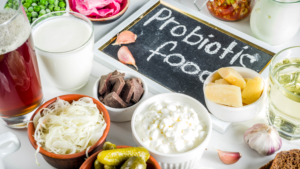Happy Belly: The Benefits of Adding Probiotics to Your Routine
A happy belly is more than just about feeling good after a meal—it’s a cornerstone of overall health. When our digestive system is working well, we feel better, have more energy, and are in a better mood. One of the easiest and most effective ways to support your digestive health is by adding probiotics to your daily routine. You’ve probably heard the term “probiotics” thrown around, but what exactly are they, and how can they help you? Let’s break it down in a simple, no-fuss way!
What Are Probiotics?
At its core, probiotics are live bacteria and yeasts that are good for you—especially your gut. Now, I know the idea of “bacteria” might sound a little intimidating, but not all bacteria are bad. In fact, we have trillions of bacteria in our bodies, many of which are essential for keeping things in balance. Probiotics help maintain that balance by promoting the growth of “good” bacteria and helping to keep the “bad” bacteria in check.
You can find probiotics in foods like yogurt, kefir, sauerkraut, kimchi, and miso, or you can take them in supplement form. Adding these little guys into your routine can have big benefits for your gut and overall health.
Why Should You Care About Probiotics?
1. They Support Digestion
First and foremost, probiotics are fantastic for your digestion. When your gut is in balance, you digest food better, absorb nutrients more effectively, and avoid that uncomfortable bloating or stomach upset. Probiotics help by encouraging the growth of healthy bacteria in your gut, which can help improve digestion and ease things like constipation, diarrhea, and bloating.
If you’ve ever had an upset stomach, probiotics might just be the relief you need. They help restore your gut’s natural balance, especially after it’s been disrupted by stress or antibiotics.
2. They Boost Your Immune System
Did you know that a huge chunk of your immune system (about 70%) lives in your gut? That means the health of your digestive system directly affects how well your body can fight off illnesses. By keeping your gut bacteria balanced, probiotics help your immune system stay strong. They do this by encouraging the production of protective antibodies and boosting the activity of immune cells.
Probiotics are like the support team for your immune system, helping your body stay ready to fend off any infections or bugs that come its way.
3. They Help with Mental Health
It might sound surprising, but your gut actually has a lot to do with your mental well-being. There’s something called the gut-brain axis, which is basically a communication highway between your gut and your brain. When your gut is healthy, it can send positive signals to your brain, helping to improve mood, reduce anxiety, and even ease depression.
Studies suggest that certain probiotics can help balance the production of chemicals like serotonin (your “feel-good” hormone) in your brain. So, if you’re feeling a little off emotionally or mentally, probiotics might just help lift your spirits.
4. They Can Help You Manage Weight
Your gut doesn’t just affect how you feel—it plays a role in how your body processes food and manages weight. Probiotics can help by regulating fat storage and supporting fat metabolism. Some research has even suggested that certain probiotic strains might help control appetite and make it easier to maintain a healthy weight.
If you’ve ever felt like your body wasn’t responding to diet or exercise like it should, probiotics might help reset things and give you a little extra boost in your weight management efforts.
5. They Make Dairy Easier to Digest
For many people, dairy can be a problem. If you’re lactose intolerant, you probably know the struggle of enjoying a bowl of ice cream or a glass of milk without paying the price in the form of bloating, gas, or stomach cramps. The good news is that probiotics can help! Certain strains of probiotics, like Lactobacillus, help break down lactose more effectively, making dairy easier on your digestive system.
If dairy has always been a trigger for you, probiotics might be the key to making it more enjoyable without the uncomfortable aftereffects.
How Can You Add Probiotics to Your Routine?
Okay, so now that you know how amazing probiotics can be, you’re probably wondering how to start adding them to your daily life. It’s actually pretty simple!
-
Eat More Fermented Foods: If you enjoy food with a tangy kick, you’re in luck! Fermented foods like yogurt, kefir, kimchi, sauerkraut, and kombucha are all great sources of probiotics. These foods are packed with live cultures that support your gut health. Try adding a little bit to your meals every day.
-
Probiotic Supplements: If fermented foods aren’t your thing, no worries! You can also find probiotics in supplement form. Just make sure you choose a high-quality supplement with diverse strains of bacteria. And as always, it’s a good idea to check in with your doctor before starting any new supplements.
-
Don’t Forget Prebiotics: In addition to probiotics, prebiotics are essential for supporting the good bacteria in your gut. Prebiotics are foods that feed probiotics, helping them thrive. Foods like garlic, onions, bananas, and asparagus are all great sources of prebiotics. Add them to your meals to give your probiotics a little extra fuel.
A happy belly means a healthier, happier you. By adding probiotics to your routine, you’re giving your digestive system, immune system, and even your mood a boost. Whether you prefer probiotic-rich foods or go the supplement route, your gut will thank you for the extra support.
So, why not show your belly some love? Start small and let probiotics work their magic. A happier, healthier gut might just be the secret ingredient to feeling your best every day!

